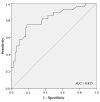Intensive Care as an Independent Risk Factor for Infection after Reconstruction and Augmentation with Autologous Bone Grafts in Craniomaxillofacial Surgery: A Retrospective Cohort Study
- PMID: 34207893
- PMCID: PMC8228131
- DOI: 10.3390/jcm10122560
Intensive Care as an Independent Risk Factor for Infection after Reconstruction and Augmentation with Autologous Bone Grafts in Craniomaxillofacial Surgery: A Retrospective Cohort Study
Abstract
Autologous bone grafts for reconstruction and augmentation are routinely used for maintaining functionality and facial aesthetics. Associated complications, however, have a significant impact on patients and health care systems. This study aims to investigate the possible risk factors associated with the occurrence of complications in order to provide evidence for the outcome of autologous bone graft reconstructive procedures. Patients from 2008 to 2018 who underwent autologous (mostly mandibular) reconstruction were included in the observational study. Clinical, pathological, and therapeutic factors were examined in univariate and multivariate analysis for significance with occurring complications. A multivariate model was used to create a prognostic model predicting the occurrence of complications. Graft complications requiring revision were exhibited by 33/128 patients. Infections were most frequent, with 4/22 patients affected by multi-resistant germs. Multivariate analysis showed radiotherapy (OR = 5.714; 95% CI: 1.839-17.752; p = 0.003), obstructive pulmonary disease (OPD) (OR = 4.329; 95% CI: 1.040-18.021; p = 0.044) and length of defect (in mm) (OR = 1.016; 95% CI: 1.004-1.028; p = 0.009) as independent risk factors associated with graft complications with high accuracy of prediction (AUC = 0.815). Intensive care (OR = 4.419; 95% CI: 1.576-12.388; p = 0.005) with a coefficient between intensive care and OPD (0.214) being low was identified as the most relevant risk factor for infection. Although intensive care is not a classic risk factor, but rather a summation of factors not reaching significance in the individual case, a stay in ICU (intensive care unit) needs to be considered for graft complications. As a clinical consequence, we recommend using the best possible hygienic measures during procedures e.g., while performing dressing and drainage changes in ICU.
Keywords: ICU; augmentation; complication; infection; prognostic model; reconstruction; risk factor.
Conflict of interest statement
The authors declare no conflict of interest.
Figures
Similar articles
-
Role of the intensive care unit in children undergoing bone marrow transplantation with life-threatening complications.Bone Marrow Transplant. 1999 Jul;24(2):163-8. doi: 10.1038/sj.bmt.1701874. Bone Marrow Transplant. 1999. PMID: 10455344
-
Autogenous bone grafts in oral implantology-is it still a "gold standard"? A consecutive review of 279 patients with 456 clinical procedures.Int J Implant Dent. 2017 Dec;3(1):23. doi: 10.1186/s40729-017-0084-4. Epub 2017 Jun 1. Int J Implant Dent. 2017. PMID: 28573552 Free PMC article.
-
Clinical results of autologous bone augmentation harvested from the mandibular ramus prior to implant placement. An analysis of 104 cases.GMS Interdiscip Plast Reconstr Surg DGPW. 2016 Oct 6;5:Doc21. doi: 10.3205/iprs000100. eCollection 2016. GMS Interdiscip Plast Reconstr Surg DGPW. 2016. PMID: 27785390 Free PMC article.
-
Predicting factors for admission to an intensive care unit and clinical outcome in pediatric patients receiving hematopoietic stem cell transplantation.Haematologica. 2002 Mar;87(3):292-8. Haematologica. 2002. PMID: 11869942
-
Overgrowth of costochondral grafts in craniomaxillofacial reconstruction: Rare complication and literature review.J Craniomaxillofac Surg. 2015 Jul;43(6):803-12. doi: 10.1016/j.jcms.2015.03.041. Epub 2015 Apr 14. J Craniomaxillofac Surg. 2015. PMID: 25964004 Review.
Cited by
-
Osseous Union after Jaw Reconstruction with Fibula-Free Flap: Conventional vs. CAD/CAM Patient-Specific Implants.Cancers (Basel). 2022 Nov 24;14(23):5774. doi: 10.3390/cancers14235774. Cancers (Basel). 2022. PMID: 36497255 Free PMC article.
References
-
- Ansari E., Chargi N., van Gemert J.T.M., van Es R.J.J., Dieleman F.J., Rosenberg A.J.W.P., van Cann E.M., Bree R. Low skeletal muscle mass is a strong predictive factor for surgical complications and a prognostic factor in oral cancer patients undergoing mandibular reconstruction with a free fibula flap. Oral Oncol. 2020;101:104530. doi: 10.1016/j.oraloncology.2019.104530. - DOI - PubMed
-
- Radwan D., Mobarak F. Plate-related complications after mandibular reconstruction: Observational study osteotomy. OMX. 2018;9:22–27. doi: 10.21608/OMX.2018.5623. - DOI
LinkOut - more resources
Full Text Sources
Research Materials




